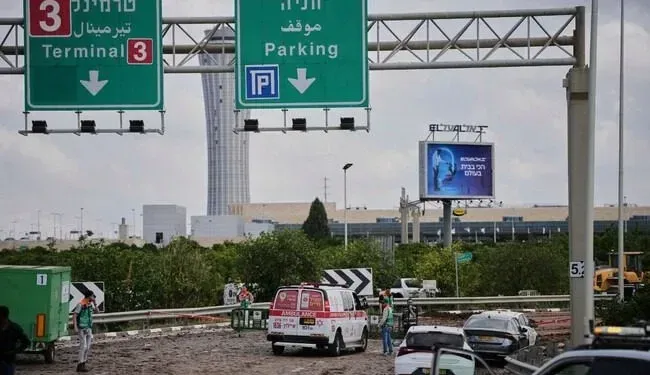A missile launched from Yemen struck near Terminal 3 of Israel’s Ben Gurion International Airport on Sunday, creating a massive crater and injuring six people. The attack, claimed by the Iran-aligned Houthi rebels, marks the most serious incident to date involving Israel’s main air travel hub and has heightened regional tensions amid ongoing conflict in Gaza.
The Israel Airports Authority confirmed that this is the first time a missile has landed in such close proximity to the terminal and runways of Ben Gurion Airport, located near Tel Aviv. The explosion, which occurred at approximately 9:35 a.m. local time, briefly suspended airport operations and prompted several international airlines to cancel or divert flights.
Missile Penetrates Israeli Defences
According to the Israeli military, multiple interception attempts were made to prevent the missile from reaching Israeli airspace. Despite these efforts, the missile managed to bypass the country’s advanced air defence systems, underscoring concerns over the expanding range and capabilities of Houthi weaponry.
“It is still unclear whether the large crater formed was caused by the Houthi missile itself or by an Israeli interceptor,” a military spokesperson said.
Central Israel’s police chief, Yair Hezroni, appeared in a video standing near the impact site, describing it as “several dozen metres wide and several dozen metres deep,” with the control tower of the airport clearly visible in the background. The missile reportedly struck close to the airport’s parking lots, just a few hundred metres from the main runway.
Injuries and Airport Disruption
Israel’s emergency medical service, Magen David Adom, reported treating six individuals for light to moderate injuries. Video footage showed passengers and airport staff taking cover immediately following the explosion.
An AFP journalist at the scene described hearing a “loud bang” and experiencing strong reverberations throughout the airport. “Security staff immediately instructed passengers to take shelter, with many directed to underground bunkers,” the journalist said.
The aviation authority later confirmed that operations had resumed and that Ben Gurion Airport was “open and operational.” However, several airlines, including Air India and British Airways, announced temporary suspensions of flights to and from Tel Aviv.
Air India diverted one of its incoming flights to Abu Dhabi, while British Airways said it would suspend Tel Aviv services until Wednesday. The Lufthansa Group — encompassing Lufthansa, Austrian Airlines, Eurowings, and SWISS — also halted flights until Tuesday.
Houthi Claim and Regional Fallout
The Houthis issued a statement shortly after the strike, claiming responsibility and asserting that a “hypersonic ballistic missile” had been used in the attack. The group framed the strike as part of its continued support for Palestinians amid the ongoing Israel–Gaza conflict.
“The missile force of the Yemeni armed forces carried out a military operation targeting Ben Gurion airport,” said a Houthi spokesperson via their official media channels.
The attack marks the fourth claimed Houthi strike on Israel in just three days, part of a broader escalation by the Yemeni rebels, who have also targeted Red Sea shipping routes and previously attempted long-range strikes into Israeli territory. The United States military has responded with near-daily airstrikes on Houthi positions since March 15.
Israeli Defence Minister Yoav Gallant and Defence Minister Israel Katz issued strong warnings in the aftermath of the attack. “Anyone who hits us, we will hit them seven times stronger,” Katz declared during a press briefing, signalling that retaliatory action could be imminent.
Praise from Militant Groups
Palestinian factions Hamas and Islamic Jihad praised the missile strike, viewing it as a symbolic blow against Israel’s infrastructure and a demonstration of growing regional solidarity.
The strike also coincides with rising concerns over the Houthis’ increasing role in the broader Middle East conflict, as they continue to align their military actions with the struggles of Palestinians in Gaza. The group controls large portions of Yemen and has received substantial support from Iran, according to U.S. and Israeli intelligence assessments.
Growing Threats to Aviation and Maritime Security
Aviation security analysts warn that Sunday’s attack signals a worrying new phase in regional conflict dynamics. The proximity of the strike to key airport infrastructure highlights vulnerabilities in even the most fortified airspaces.
The incident also contributes to growing instability in Middle Eastern air corridors and trade routes, compounding concerns that began when the Houthis started targeting commercial ships in the Red Sea earlier this year. Global trade through the Red Sea has already been disrupted by similar Houthi attacks, prompting military responses from both the U.S. and European naval forces.







